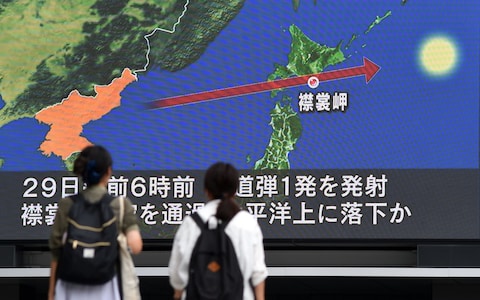Special to WorldTribune.com
 By Donald Kirk
By Donald Kirk
WASHINGTON – The CIA has struck alarm bells here with a top-secret report to President Trump telling him he has just three months to stop North Korea from having the ability to fire a nuclear warhead at the United States.
The report has deepened the bitter divide between hawks and doves over what to do to halt North Korea’s steady march toward full development of the nuclear capability needed to blackmail the U.S. and its allies.
Some noted American conservatives are calling for a pre-emptive strike on the North’s nuclear and missile facilities even without prior consultation with President Moon Jae-In, who opposes military action against the North.

The most outspoken advocate of a preemptive strike, John Bolton, former UN ambassador, has said bluntly that sanctions are not having the necessary impact. “If the State Department is still focused on sanctions,” he said during a visit to London. “I will guarantee you North Korea will have deliverable nuclear weapons.”
Bolton, like many others, expressed the view that China really held the key to getting North Korea to halt its nuclear program. “The one diplomatic play that’s left here is with China,” said Bolton, but Xi has failed to stop the flow of oil on which North Korea depends for economic and military survival.
Across the political spectrum, others share the same sense of urgency – but suggest intensified diplomacy rather than a military response.
“The drumbeat for a potentially devastating war on the Korean peninsula, and one that could quickly spread with calamitous consequences, has grown louder in the wake of North Korea’s latest missile test,” wrote Mark Seddon, a former aide to Ban Ki-Moon when he was UN Secretary-General and now a lecturer at Columbia University.
The CIA report has heightened the sense of alarm among experts who believed earlier estimates that North Korea needed another two or three years to develop the ability to fix a warhead to a missile and send it hurtling to the U.S. The fear, however, is that North Korea, if attacked, would respond with a barrage of artillery fire and missiles that could cost tens of thousands of lives in the Seoul-Incheon region.
Debate raged as hundreds of U.S. and South Korean warplanes staged massive exercisers intended to show how swiftly they could wipe out targets in North Korea. Some experts pinned hopes on dialogue and reconciliation while urging the U.S. to tone down the scope of military activities in the region.
William Perry, U.S. defense secretary during the presidency of Bill Clinton, does not believe US. warplanes should stage shows of force against North Korea by flying near the line between the two Koreas.
“We should avoid exercises that don’t work and could prove dangerous,” Perry told a forum here of the Arms Control Association focusing on the North Korean threat and what to do about it.
Perry spoke as U.S. warplanes, including a B-IB bomber based at Andersen Air Force Base in Guam, have been flying this week in tandem with South Korean warplanes in a massive exercise that was planned long before North Korea’s latest test of an intercontinental ballistic missile.
Perry did not, however, oppose the exercises. Instead he differentiated between conducting exercises to improve coordination between U.S. and South Korean forces and exercises whose purpose was to frighten or intimidate Kim Jong-Un.
The point, he reminded an audience at the Carnegie Endowment for International Peace, “is to strengthen the capabilities of the United States and the Republic of Korea to work together, to strengthen their capability to respond to attack..
Perry’s viewpoint came as a surprise to some observers who had expected him to adopt a more compromising position. While opposed to shows of force that would probably have little or no real impact on North Korean leader Kim Jong-Un’s program for developing a missile capable of reaching the U.S., Perry said “we should not be talking about decreasing military capabilities.
“If anything,” he said, “we should be talking about increasing our air, naval and missile defense.” At the same time, he went on, the U.S. should offer “a bucket full of goodies,” in the form of “economic incentives,” including removal or relaxation of sanctions imposed against North Korea
Perry did not seem at all optimistic, however, about reconciliation with North Korea. “Diplomacy is far preferable to deterrence,” he said, “but diplomacy has failed.” Thus, he went on, “We cannot give up our defenses for deterrence.”
Other panelists at the forum offered views on how to deal with North Korea. Suzanne DiMaggio of the left-leaning New America Foundation called for the U.S. and South Korea to “adjust” military exercises in exchange for a “freeze” in testing of nukes and missiles by North Korea.
It was necessary, said DiMaggio, to provide “an off-ramp” from the high level of tensions especially since President Trump, invoked the image of “fire and fury” over North Korea in his speech at the United Nations in September. She doubted that more sanctions “would change the calculus” – that is, alter North Korea’s position.
DiMaggio, who has been involved in “track 2” talks with North Koreans at which U.S. experts exchange views unofficially with North Korean officials, seemed to believe that North Korea could be persuaded to accept a freeze-for-freeze formula. The U.S. should “move aggressively to talk about talks first to convince the North Koreans to freeze testing,” she said. Then the U.S. could offer “not suspension” of military exercises but “some adjustment.”
DiMaggio also called for assurances that North Korea would not spread nuclear and missile technology to other countries. “Non-proliferation,” she said had to rank high on the agenda. “A lot of important issues,” she said, could be discussed in negotiations with North Korea.
Missing from both her comments and those of William Perry was mention of South Korea’s role in bringing about negotiations.
Perry repeatedly said the U.S. should act “in conjunction with China” in attempting to get Kim Jong-Un to alter his policy. DiMaggio, when questioned, conceded the South Koreans “should be consulted every step of the way” but noted, “realistically, the North Koreans have made it clear they only want to talk to the U.S.”
Subscribe to Geostrategy-Direct __________ Support Free Press Foundation
